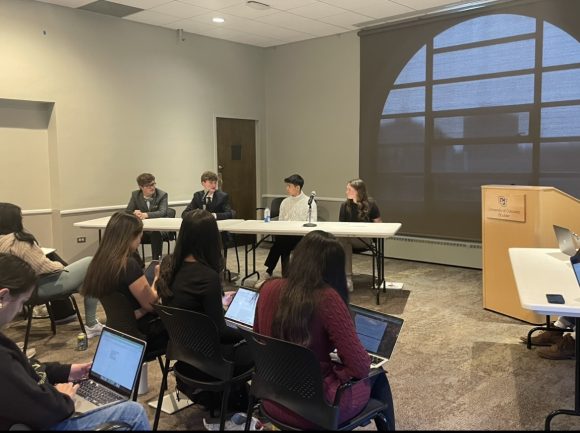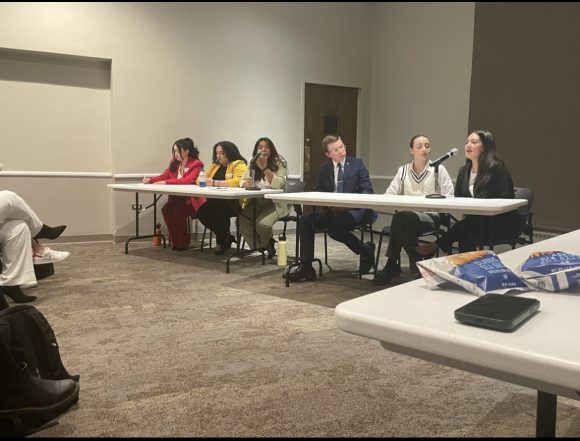
From left to right: Keenan Powell, Weston Lilley, Alexander Zyles and Kellen Nelson at the CUSG debate on March 23. (William Oster / CU Independent)
Editor’s note: An earlier version of this story misspelled Crisol Guzman Corral’s name. It has since been corrected.
The University of Colorado Boulder Student Government (CUSG) held its first and only debate for representative-at-large and tri-executives seats on Wednesday, March 22, in the University Memorial Center.
Run by the CUSG Election Commission and moderated by editors from the CU Independent and The Bold, candidates made their case as to why they should be elected to student government and what sort of policy they would implement to improve student outreach and life on campus.
A total of four candidates are running for the representative-at-large seats: Alexander Zyles, Keenan Powell, Kellen Nelson and Weston Lilley.
Two tickets, with three students each, are vying for the tri-executive seats.
Chase Cromwell, Gaby Aguijosa and Narayana Bertholtz represented the Vision ticket, running on a platform of transparency, campus community and student growth.
Brittany Gutierrez, Casandra Garcia Vega and Crisol Guzman Corral represented the Butterfly Effect ticket, running on a platform of transparency, education, campus safety, accessibility and community.
Here are the key takeaways from the debates.
For representatives-at-large, what you see is what you get
With four vacant seats for representative-at-large and four candidates on the ticket, each candidate will secure a seat in student government no matter their performance during election week.
Alexander Zyles is the only candidate to serve in previous legislative sessions, compared to the other three candidates who haven’t held any previous office at the college level. One candidate argued this lack of experience could be used to her advantage.
“I have no experience with CUSG as an organization, so that means I’m going to be able to learn a lot from all the experienced people that have been here for a long time,” said Kellen Nelson, a freshman. “I have four years of elective experience [in high school], so I know what it means to organize and do the hard work when it’s necessary.”
Weston Lilley, also a freshman, seeks to learn from current members of the legislative branch as well and is running to improve CUSG’s campus involvement.
“One of the biggest ways to show students about CU student government would be through campus-wide events,” said Lilley. “[It’s] not directly related to a certain event, like sports, but something general that most people can relate to.”
Keenan Powell, a sophomore majoring in music composition and mathematics, is seeking to provide a new perspective to CUSG, as he is studying in both the smallest college on campus and the largest. One of his biggest initiatives when elected is to strengthen the relationship between the three student government branches by equalizing their power.
“I’ve sat in on some of the legislative sessions, and I’ve felt some of the tension between the executive branch and the legislative branch,” Powell said. “I think, ultimately, compromise is a really helpful thing there…really making those personal connections could help solve some of the distrust among the CUSG branches.”
Appeals to freshmen were vital among representative-at-large candidates
Outreach was at the top of candidates’ minds in the representative-at-large debate. Candidates laid out ideas on how to increase voter turnout and general student government awareness.
Zyles pitched more student government tabling at the UMC and at campus networking events, while Lilley pitched increasing communication channels and Powell argued that office hours, which he claimed were removed due to a lack of participation from students, should be reintroduced.
But it was Nelson who had a clear vision of how to reach freshmen. She advocated for utilizing more advertising in freshmen dorms across campus and said student government should use the first few weeks of the fall semester to connect with more campus community members.
“For me, as a freshman coming in, it was really difficult for me to find and connect with a lot of clubs and organizations,” she said. “Especially CUSG.”
Gesturing to the audience, she added, “As we can see, there’s a very small group sitting in front of us when plenty of people could have come and seen this debate. I think more class-specific [advertising] and more aggressive advertising is needed to get students involved and interested in what’s happening with CUSG.”

The Butterfly Effect ticket, left, and the Vision ticket, right at the March 23 CUSG debate. (William Oster / CU Independent)
For tri-executive candidates, a change in traditional hierarchy
Executives have various roles and responsibilities in CUSG, with each tri-executive typically settling into one of three positions: Internal tri-executive, which handles matters relating to the CUSG legislature; External tri-executive, which focuses mainly on outreach to the Boulder city council and community; and student affairs tri-executive, a more front-facing role relating to student needs.
However, at Wednesday’s debate, both tickets made it clear they want to reform how tri-executives handle their work.
“That system has been done,” said Chase Cromwell of the Vision ticket. “We would like to find a way to divide up responsibilities for each tri-executive, but where we can all be involved in everything that CUSG does.”
As for how work would be allocated, Cromwell says that’s still up in the air, but that discussing the issue with Student Affairs on how that could make sense for everyone involved would be the first step.
The Butterly Effect ticket felt similarly, addressing the role the tri-executives play in student government as a whole.
“We have seen a kind of system of hierarchy in student government, whether it be in one branch alone or in just the three branches itself,” said Corral, who was previously a representative-at-large and served as the 96th session legislative council president. “At the end of the day, we are running as a ticket together. There’s no reason that we need to exclude ourselves to one specific position.”
On the deficit, a difference between budget cuts or a more hands-off approach
As it stands, CUSG has a $2.8 million deficit and will most likely not be able to authorize any more additional reallocated or extra funds to new projects. Each ticket has a different approach to how they would tackle CUSG’s deficit.
Vision said they expected the budgetary problems should solve themselves, as student fees allocated to pay off existing debt is freed up in the coming years.
“The current deficit is due to the projects which are currently underway and haven’t been completed,” said Bretholtz. “We see this as something that will largely fix itself as it had to do with how we’re going to go about proposing new things.”
Should the projects not fix themselves, however, the Vision ticket will consider budget cuts if needed. Bretholtz added cuts are “something we think should be done collaboratively throughout CUSG and done with transparency and community involvement.”
The Butterfly Effect ticket would be willing to make cuts if needed, outlining how they would rethink existing joint boards and consider consolidating them if needed.
“There’s a lot of joint boards on our campus and I feel like a lot of them already work together,” said Corral. “So being able to combine them and create a budget for those two boards together might help with efficiency and to make sure our student organizations are being listened to.”
As to whether there were any specific boards the Butterfly Effect ticket had in mind for consolidation, they said they didn’t have any concrete plans yet but would discuss further with the finance board.
Voting for representative-at-large and tri-executives opens on April 3 and will continue through April 7. Students will receive an email to vote through their university email or can find the link to vote through the CUSG website.
Editor’s note: An earlier version of this story incorrectly stated the election would run through April 10. It has since been updated.
Contact CU Independent Managing Editor William Oster at william.oster@colorado.edu.
